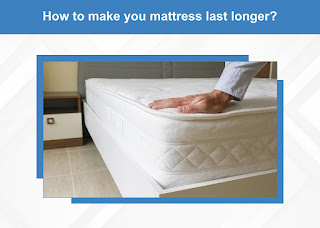How to make your mattress last longer ?
Once you’ve invested in the best mattress, chances are you
expect it to provide comfortable sleep on it for many years. A good mattress can significantly improve the
quality of your sleep and, consequently, your overall health.
The journey to prolonging your mattress's life begins with the
initial purchase. Choose a mattress that suits your sleep needs, body type, and
comfort preferences. Mattresses are available in various materials, including
memory foam, innerspring, latex, and hybrid options. Research and test
different types to find the one that offers the best support and comfort for
you. A well-suited mattress is more likely to stay comfortable and supportive
over time.
One of the simplest and most effective ways to protect your
mattress is by using a mattress protector. This waterproof, breathable cover
acts as a barrier against spills, stains, dust mites, and allergens. It helps
prevent moisture from seeping into the mattress, which can lead to mold and
mildew growth. Regularly washing and replacing your mattress protector is a
small investment that can pay significant dividends in terms of mattress
longevity.
To ensure even wear and tear, it's advisable to rotate your
mattress regularly. Most mattresses benefit from being rotated 180 degrees
every 3-6 months. However, consult your mattress manufacturer's guidelines, as
some newer models are designed to be one-sided and may not require rotation.
Rotating your mattress helps prevent sagging and ensures that you're
distributing your weight evenly across the entire surface.
Maintaining a clean mattress is essential for its longevity and
your health. Dust, allergens, and debris can accumulate over time, affecting
the mattress's performance and air quality in your bedroom. To clean your
mattress:
Your mattress's support system is just as crucial as the
mattress itself. Ensure that you have a sturdy, well-maintained bed frame or
foundation that can adequately support your mattress's weight. A sagging or
damaged foundation can lead to premature wear and affect the mattress's comfort
and lifespan.
Avoid placing excessive weight on one specific area of your
mattress. This can lead to uneven wear and cause sagging or indentations.
Consider using a mattress with reinforced edges if you tend to sit or sleep
near the edge of the bed.
Refrain from jumping or bouncing on the mattress, especially if
you have children. Excessive force can damage the mattress's inner components
and reduce its lifespan.
Lastly, always follow the care and maintenance guidelines
provided by the mattress manufacturer. These guidelines are specific to your
mattress's materials and construction and will help you make informed decisions
regarding care, cleaning, and warranty coverage.




Comments
Post a Comment